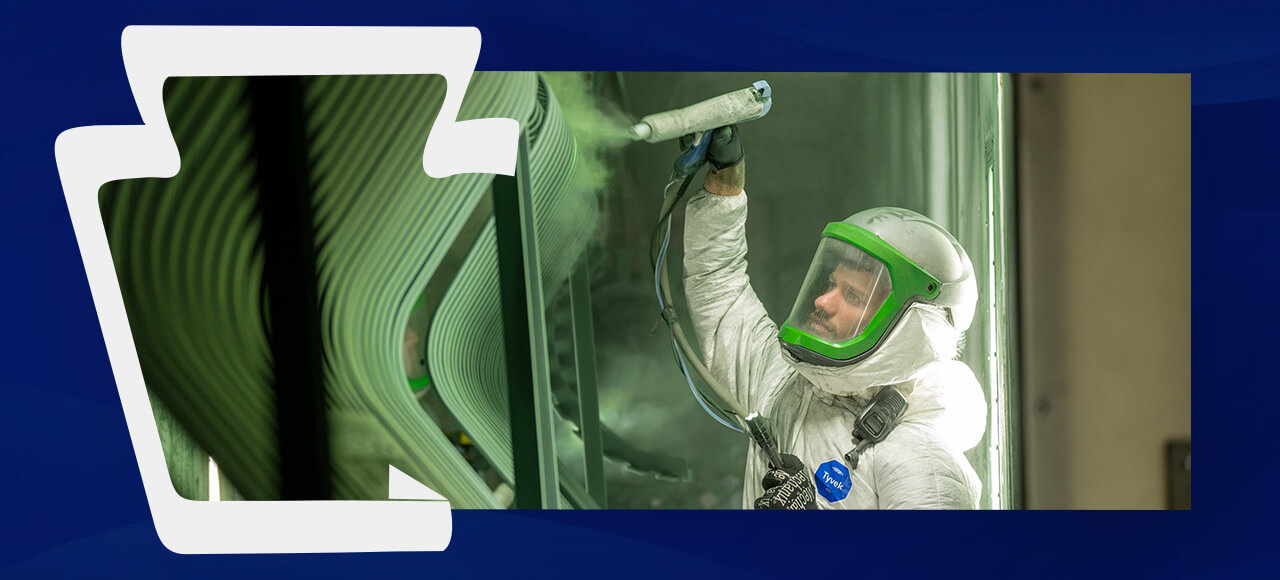
Powder coating has applications in a variety of industries. Its corrosion protection, chemical resistance and aesthetic appeal make it an ideal finish for agricultural implements, vehicles and even medical equipment.
When you choose powder over liquid paint, your parts are coated with a layer that provides better protection. Color, sheen and texture make up the customizable elements of your chosen finish. However, businesses should start the coating process by choosing the type of powder that best fits their needs.
Keystone Koating offers several types of powder coating, including epoxy, polyester and fluoropolymer. We also offer coatings like urethane, silicone and hybrids.
Epoxy Powder Coating
Despite being one of the first powder coats commonly available, epoxy remains one of the most popular finishes. It’s an excellent choice for manufacturers in several industries. The reason for this popularity lies in the benefits of using epoxy. Advanced hardness and impressive resistance to chemicals and corrosion are just two factors that give epoxy its value.
Epoxy is durable. However, it is limited to indoor use. Exposure to UV rays will cause fading, chalking and other surface-level degradation.
Some of the industries that use epoxy powder coating are:
- Medical equipment
- Oil drilling
- Natural gas production
Benefits of Epoxy Powder Coating
Choose an epoxy powder coat for several benefits, including:
- Uniformity
- Hardness
- Strong adhesion with pretreatments
Polyester Powder Coating
Polyester has less chemical resistance than other coating options. However, the powder is so weather-resistant that it’s common on products like fencing. The quality that makes polyester powder coatings stand out is their low cure temperature, which makes them ideal for more heat-sensitive items.
There are two types of polyester powder coatings — TGIC and urethane polyester. TGIC has a lower cure temperature than urethane polyester. The other constraint on polyester urethanes lies in its minimum thickness, because it can have a peeling effect on the coating.
Polyester powder coating has applications in the following industries:
- Plumbing
- Power transmission
- Outdoor decorations and furniture
Benefits of Polyester Powder Coating
Using a polyester powder coat has several advantages, including:
- Cost efficiency
- Overbake resistance
- Wide range of color choices
Fluoropolymer Powder Coating
Fluoropolymer powder coatings perform at peak levels in specific applications. One such application is its use in architectural markets. Fluoropolymers have incredible weathering properties. First, they have a high corrosion resistance. Fluoropolymer’s gloss and color retention are signs of its impressive durability. There are two common types of fluoropolymer powder coatings:
- Polyvinylidene difluoride (PVDF) resin: Using a PVDF fluoropolymer powder coat requires applying a primer first. Bonding for metallic coats is more difficult with PVDF resins.
- Fluoroethylene vinyl ether (FEVE) resin: FEVE fluoropolymers are more popular because they create a full-coverage powder coat with one application. FEVE powders also perform better in exterior conditions. In metallic FEVE fluoropolymer powder coats, the metal flake is distributed more evenly.
Benefits of Fluoropolymer Powder Coating
Using a fluoropolymer powder coat has several benefits. These include:
- UV stability for outdoor us
- One-coat capability
- Long-lasting color
Powder Coating in Central PA
Keystone Koating provides commercial powder coating services. From blasting and an eight-stage pretreatment to coating and curing, we do it all. Once we’ve finished your order, we’ll package it and ship your order back to you. If necessary, our team can also perform minor assembly tasks to save you time and resources upon receipt of your order.
Contact Keystone Koating for more information about our start-to-finish powder coating services. You can also fill out our online form to get a quote on high-volume coating projects for your business.

